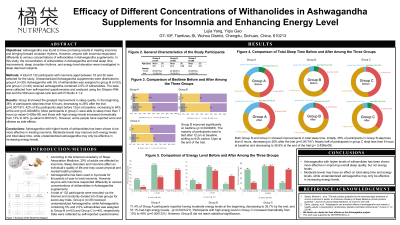Back

Objectives: Ashwagandha was found to have promising results in treating insomnia and bringing forward circadian rhythms. However, anyone with insomnia responded differently to various concentrations of withanolides in Ashwagandha supplements. In this study, the concentration of withanolides in Ashwagandha and total sleep time improvement, sleep circadian rhythms, and energy level elevation were investigated in sleep deprived subjects.
Methods: A total of 132 participants with insomnia aged between 18 and 50 were selected for inclusion in the study. Unstandardized Ashwagandha supplements were distributed to group A (n=39). Ashwagandha with 5% of withanolides was assigned to group B (n=53), and group C (n=40) received ashwagandha contained 2.5% of withanolides. The data were collected from self-reported questionnaires and analyzed using the Shapiro-Wilk test and the Wilcoxon signed-rank test with R Studio 4.1.2.
Results: Group B showed the greatest improvement in sleep quality. In the beginning, 38% of participants slept less than 6 hours, decreasing to 26% after the trial (p=0.007197). 42% of the participants slept before 12am at baseline, increasing to 64% at the end (p=0.0004883). More participants in group C were able to sleep more than 7 hours (p-value=3.426e-05) and those with high energy levels increased dramatically from 13% to 40% (p-value=0.0001221). However, some people have reported acne and oiliness as side effects.
Conclusions: Ashwagandha with higher levels of withanolides has been shown to be more effective in treating insomnia. Moderate levels may improve both energy levels and total sleep time, while unstandardized ashwagandha may only be effective in increasing energy levels.
Funding Sources: The company Nutripacks sponsored this testing trial.
Nutrition Translation and Communications
(PO21-02-22) Efficacy of Different Concentrations of Withanolides in Ashwagandha Supplements for Insomnia and Enhancing Energy Level

.jpg)
Lujia Yang, RD
– Researcher, Nutripacks LLC, Chengdu, Sichuan, China (People's Republic)- XC
Xuewen Chen
– NUTRIPACKS LLC - YG
Yiqiu Gao
– NUTRIPACKS LLC
Presenting Author(s)
Co-Author(s)
Disclosure(s):
Lujia Yang, RD: NUTRIPACKS LLC: Employee (Ongoing)
Objectives: Ashwagandha was found to have promising results in treating insomnia and bringing forward circadian rhythms. However, anyone with insomnia responded differently to various concentrations of withanolides in Ashwagandha supplements. In this study, the concentration of withanolides in Ashwagandha and total sleep time improvement, sleep circadian rhythms, and energy level elevation were investigated in sleep deprived subjects.
Methods: A total of 132 participants with insomnia aged between 18 and 50 were selected for inclusion in the study. Unstandardized Ashwagandha supplements were distributed to group A (n=39). Ashwagandha with 5% of withanolides was assigned to group B (n=53), and group C (n=40) received ashwagandha contained 2.5% of withanolides. The data were collected from self-reported questionnaires and analyzed using the Shapiro-Wilk test and the Wilcoxon signed-rank test with R Studio 4.1.2.
Results: Group B showed the greatest improvement in sleep quality. In the beginning, 38% of participants slept less than 6 hours, decreasing to 26% after the trial (p=0.007197). 42% of the participants slept before 12am at baseline, increasing to 64% at the end (p=0.0004883). More participants in group C were able to sleep more than 7 hours (p-value=3.426e-05) and those with high energy levels increased dramatically from 13% to 40% (p-value=0.0001221). However, some people have reported acne and oiliness as side effects.
Conclusions: Ashwagandha with higher levels of withanolides has been shown to be more effective in treating insomnia. Moderate levels may improve both energy levels and total sleep time, while unstandardized ashwagandha may only be effective in increasing energy levels.
Funding Sources: The company Nutripacks sponsored this testing trial.

.png)
